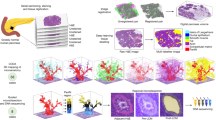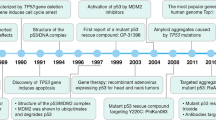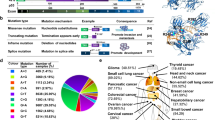Abstract
Although prostate-specific antigen (PSA) is considered a uniquely important tumor marker and is broadly used for early detection of prostate cancer, the molecular mechanisms underlying its elevated expression in tumors have been unknown. By using cDNA microarray gene expression profiling, we found a fourfold increase in the PSA mRNA level in prostatic carcinoma cell line LNCaP, in which the p53 pathway was suppressed by a dominant negative p53 mutant. Consistently, p53 suppression caused a 4–8-fold increase in secretion of PSA protein in culture medium, suggesting that PSA gene expression is under negative control of p53. While wild type p53 strongly repressed, dominant negative p53 mutants stimulated PSA promoter-driven transcription and secretion of PSA in transient transfection experiments. The inhibitory effect of wild type p53 was undetectable in the presence of trychostatin A, suggesting the involvement of histone deacetylation in negative regulation of PSA promoter activity. Thus, PSA is likely to be a tissue specific indicator of transformation-associated p53 suppression in prostate cells. This finding provides a plausible explanation for a frequent increase of PSA levels in advanced prostate cancer.
This is a preview of subscription content, access via your institution
Access options
Subscribe to this journal
Receive 50 print issues and online access
$259.00 per year
only $5.18 per issue
Buy this article
- Purchase on Springer Link
- Instant access to full article PDF
Prices may be subject to local taxes which are calculated during checkout




Similar content being viewed by others
References
Abate-Shen C, Shen MM . 2000 Genes Dev. 14: 2410–2434
Cleutjens KB, van der Korput HA, van Eekelen CC, van Rooij HC, Faber PW, Trapman J . 1997 Mol. Endocrinol. 11: 148–161
Coffey DS . 1993 Cancer 71: Suppl. 880–886
Cordon-Cardo C, Sheinfeld J, Dalbagni G . 1997 Semin. Surg. Oncol. 13: 319–327
Gottlieb TM, Oren M . 1996 Biochim. Biophys. Acta. 1287: 77–102
Kim J, Logothetis CJ . 1999 Urol. Clin. North Am. 26: 281–290
Kley N, Chung RY, Fay S, Loeffle JP, Seizinger BR . 1992 Nucleic Acids Res. 20: 4083–4087
Montgomery BT, Young CY, Bilhartz DL, Andrews PE, Prescott JL, Thompson NF, Tindall DJ . 1992 Prostate 21: 63–73
Murphy M, Ahn J, Walker KK, Hoffman WH, Evans RM, Levine AJ, George DL . 1999 Genes Dev. 13: 2490–2501
Osman I, Drobnjak M, Fazzari M, Ferrara J, Scher HI, Cordon-Cardo C . 1999 Clin. Cancer Res. 5: 2082–2088
Ossovskaya VS, Mazo IA, Chernov MV, Chernova OB, Stark GR, Chumakov PM, Gudkov AV . 1996 Proc. Natl. Acad. Sci. USA 93: 10309–10314
Ozen M, Pathak S . 2000 Anticancer Res. 20: 1905–1912
Quinn DI, Henshall SM, Head DR, Golovsky D, Wilson JD, Brenner PC, Turner JJ, Delprado W, Finlayson JF, Stricker PD, Grygiel JJ, Sutherland RL . 2000 Cancer Res. 60: 1585–1594
Rokhlin OW, Gudkov AV, Kwek SS, Glover RA, Gewies AS, Cohen MB . 2000 Oncogene 19: 1959–1968
Schuur ER, Henderson GA, Kmetec LA, Miller JD, Lamparski HG, Henderson DR . 1996 J. Biol. Chem. 271: 7043–7051
Stachhouse GB, Sesterhenn IA, Bauer JJ, Mostofi FK, Connelly RR, Srivastava SK, Moul JW . 1999 Urology 162: 2040–2045
Steele RJ, Thompson AM, Hall PA, Lane DP . 1998 Br. J. Surg. 85: 1460–1467
Sun Y, Sun Y, Wenger L, Rutter JL, Brinckerhoff CE, Cheung HS . 1999 J. Biol. Chem. 274: 11535–11540
Szende B, Romics I, Torda I, Bely M, Szegedi Z, Lovasz S . 1999 Urol. Int. 63: 115–119
Trapman J, Cleutjens KB . 1997 Semin. Cancer Biol. 8: 29–36
Xu D, Wang Q, Gruber A, Bjorkholm M, Chen Z, Zaid A, Selivanova G, Peterson C, Wiman KG, Pisa P . 2000 Oncogene 19: 5123–5133
Yeung F, Li X, Ellett J, Trapman J, Kao C, Chung LW . 2000 J. Biol. Chem. 275: 40846–40855
Young CY, Montgomery BT, Andres PE, Qui SD, Bilhartz DL, Tindall DJ . 1991 Cancer Res. 51: 3748–3752
Zhang S, Murtha PE, Young CY . 1997a Biochem. Biophys. Res. Comm. 231: 784–788
Zhang J, Zhang S, Murtha PE, Zhu W, Hou SS, Young CY . 1997b Nucleic Acids Res. 25: 3143–3150
Acknowledgements
We thank Anna Acosta for help in measuring PSA levels in culture media and Karen Toil for help in manuscript preparation. This work was supported by grants CA76673 to MB Cohen and CA75179 from the National Institutes of Health and Quark Biotech, Inc. to AV Gudkov.
Author information
Authors and Affiliations
Corresponding author
Rights and permissions
About this article
Cite this article
Gurova, K., Roklin, O., Krivokrysenko, V. et al. Expression of prostate specific antigen (PSA) is negatively regulated by p53. Oncogene 21, 153–157 (2002). https://doi.org/10.1038/sj.onc.1205001
Received:
Revised:
Accepted:
Published:
Issue Date:
DOI: https://doi.org/10.1038/sj.onc.1205001
Keywords
This article is cited by
-
Tumor suppressor p53 regulates heparanase gene expression
Oncogene (2006)
-
Functional endogenous cytotoxic T lymphocytes are generated to multiple antigens co-expressed by progressing tumors; after intra-tumoral IL-2 therapy these effector cells eradicate established tumors
Cancer Immunology, Immunotherapy (2006)
-
A clinical study on prostate cancer diagnosis with cDNA macroarray
Chinese Journal of Cancer Research (2005)
-
Inhibition of p53 function diminishes androgen receptor-mediated signaling in prostate cancer cell lines
Oncogene (2004)



